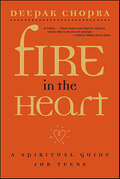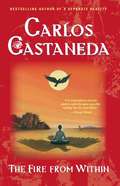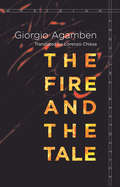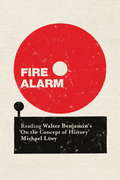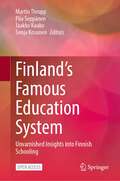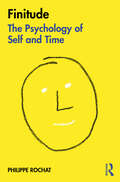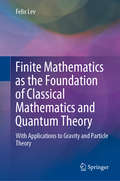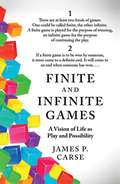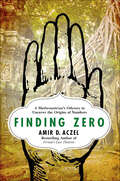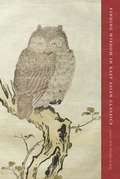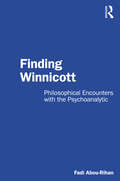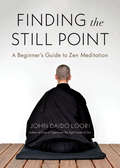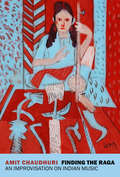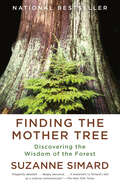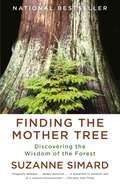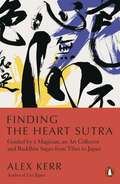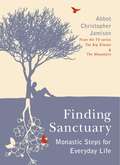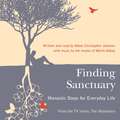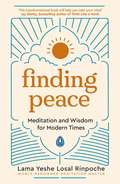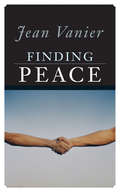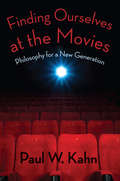- Table View
- List View
Fire in the Heart: A Spiritual Guide for Teens
by Deepak ChopraA fifteen-year-old boy is walking through a swirling fog on his way to school when a voice calls out, "Come here. We need to talk." Out of the mist emerges an old man with a white beard. He is a fantastic figure, as wizardly as Merlin, as wise as Socrates, as peaceful as Buddha. Whoever he is, the old man has appeared on that very day to change the boy's life. "You are old enough to learn about things," he says mysteriously. "And who is going to teach you but me?" The old man gives the boy four days of "soul training," a time of riddles, tricks, parables, and incredible twists that brings out surprising answers to each of four burning questions about spirituality: Do I have a soul? How do wishes come true? What is the supreme force in the universe? How can I change the world? "The old man with the white beard showed me the spiritual side of life," writes Deepak Chopra, "where real passion and excitement come from. So before you begin, take a deep breath. This story could turn out to be yours."
The Fire From Within
by Carlos CastanedaFire from Within is the author's most brilliant thought-provoking and unusual book, one in which Castaneda, under the tutelage of don Juan and his "disciples," at last constructs, from the teachings of don Juan and his own experiences, a stunning portrait of the "sorcerer's world" that is crystal-clear and dizzying in its implications. Each of Carlos Castaneda's books is a brilliant and tantalizing burst of illumination into the depths of our deepest mysteries, like a sudden flash of light, like a burst of lightning over the desert at night, which shows us a world that is both alien and totally familiar -- the landscape of our dreams.
The Fire and the Tale
by Giorgio Agamben Lorenzo ChiesaWhat is at stake in literature? Can we identify the fire that our stories have lost, but that they strive, at all costs, to rediscover? And what is the philosopher's stone that writers, with the passion of alchemists, struggle to forge in their word furnaces? For Giorgio Agamben, who suggests that the parable is the secret model of all narrative, every act of creation tenaciously resists creation, thereby giving each work its strength and grace. The ten essays brought together here cover works by figures ranging from Aristotle to Paul Klee and illustrate what urgently drives Agamben's current research. As is often the case with his writings, their especial focus is the mystery of literature, of reading and writing, and of language as a laboratory for conceiving an ethico-political perspective that places us beyond sovereign power.
Fire Alarm: Reading Walter Benjamin's 'On the Concept of History'
by Michael Lowy Chris TurnerThis illuminating study of Benjamin's final essay helps unlock the mystery of this great philosopherRevolutionary critic of the philosophy of progress, nostalgic of the past yet dreaming of the future, romantic partisan of materialism -- Walter Benjamin is in every sense of the word an "unclassifiable" philosopher. His essay "On the Concept of History" was written in a state of urgency, as he attempted to escape the Gestapo in 1940, before finally committing suicide.In this scrupulous, clear and fascinating examination of this essay, Michael Löwy argues that it remains one of the most important philosophical and political writings of the twentieth century. Looking in detail at Benjamin's celebrated but often mysterious text, and restoring the philosophical, theological and political context, Löwy highlights the complex relationship between redemption and revolution in Benjamin's philosophy of history.From the Trade Paperback edition.
Finland’s Famous Education System: Unvarnished Insights into Finnish Schooling
by Martin Thrupp Piia Seppänen Jaakko Kauko Sonja KosunenThis open access book provides academic insights and serves as a platform for research-informed discussion about education in Finland. Bringing together the work of more than 50 authors across 28 chapters, it presents a major collection of critical views of the Finnish education system and topics that cohere around social justice concerns. It questions rhetoric, myths, and commonly held assumptions surrounding Finnish schooling.This book draws on the fields of sociology of education, education policy, urban studies, and policy sociology. It makes use of a range of research methodologies including ethnography, case study and discourse analysis, and references the work of relevant theorists, including Bourdieu and Foucault. This book aims to provide a critical, updated and astute analysis of the strengths and challenges of the Finnish education system.
FINITUDE: The Psychology of Self and Time
by Philippe RochatPhilippe Rochat’s FINITUDE is a rumination on time and self-consciousness. It is built around the premise that finitude and separation form the human self-conscious reality of time. It argues that we need to reclaim time from current theories in physics that tend to debunk time as an illusion, or state that time simply does not exist. This thought-provoking book considers how, from a human psychological and existential standpoint, time is very real. It examines how we make sense of such reality in human development and in comparison to other living creatures. The book explores how we represent time and live with it. It tries to capture the essence of time in our self-conscious mind. If we opt to live for as long as possible and knowing that it is going to end, how should we exist? FINITUDE contemplates this most serious psychological question. It considers the developmental origins of human subjectivity, the foundations of our sense of being alive and the explicit awareness of existing in finite time. It deals with how we live and represent our finite time, how we construe and archive in memory the events of our life, how we project ourselves into the future, and how we are all constrained to knowingly exist in finite time Offering an overarching understanding of concepts, above and beyond the methodological details, this book will be an essential reading for all advanced students and researchers interested in the psychology of time, and the development of self.
Finite Mathematics as the Foundation of Classical Mathematics and Quantum Theory: With Applications to Gravity and Particle Theory
by Felix LevThis book delves into finite mathematics and its application in physics, particularly quantum theory. It is shown that quantum theory based on finite mathematics is more general than standard quantum theory, whilst finite mathematics is itself more general than standard mathematics.As a consequence, the mathematics describing nature at the most fundamental level involves only a finite number of numbers while the notions of limit, infinite/infinitesimal and continuity are needed only in calculations that describe nature approximately. It is also shown that the concepts of particle and antiparticle are likewise approximate notions, valid only in special situations, and that the electric charge and baryon- and lepton quantum numbers can be only approximately conserved.
Finite and Infinite Games
by James Carse"There are at least two kinds of games," states James Carse as he begins this extraordinary book. "One could be called finite; the other infinite." Finite games are the familiar contests of everyday life; they are played in order to be won, which is when they end. But infinite games are more mysterious. Their object is not winning, but ensuring the continuation of play. The rules may change, the boundaries may change, even the participants may change--as long as the game is never allowed to come to an end. What are infinite games? How do they affect the ways we play our finite games? What are we doing when we play--finitely or infinitely? And how can infinite games affect the ways in which we live our lives? Carse explores these questions with stunning elegance, teasing out of his distinctions a universe of observation and insight, noting where and why and how we play, finitely and infinitely. He surveys our world--from the finite games of the playing field and playing board to the infinite games found in culture and religion--leaving all we think we know illuminated and transformed. Along the way, Carse finds new ways of understanding everything from how an actress portrays a role, to how we engage in sex, from the nature of evil, to the nature of science. Finite games, he shows, may offer wealth and status, power and glory. But infinite games offer something far more subtle and far grander. Carse has written a book rich in insight and aphorism. Already an international literary event, Finite and Infinite Games is certain to be argued about and celebrated for years to come. Reading it is the first step in learning to play the infinite game.
Finite and Infinite Games
by James Carse“There are at least two kinds of games,” states James P. Carse as he begins this extraordinary book. “One could be called finite; the other infinite.” Finite games are the familiar contests of everyday life; they are played in order to be won, which is when they end. But infinite games are more mysterious. Their object is not winning, but ensuring the continuation of play. The rules may change, the boundaries may change, even the participants may change—as long as the game is never allowed to come to an end. What are infinite games? How do they affect the ways we play our finite games? What are we doing when we play—finitely or infinitely? And how can infinite games affect the ways in which we live our lives? Carse explores these questions with stunning elegance, teasing out of his distinctions a universe of observation and insight, noting where and why and how we play, finitely and infinitely. He surveys our world—from the finite games of the playing field and playing board to the infinite games found in culture and religion—leaving all we think we know illuminated and transformed. Along the way, Carse finds new ways of understanding everything, from how an actress portrays a role to how we engage in sex, from the nature of evil to the nature of science. Finite games, he shows, may offer wealth and status, power and glory, but infinite games offer something far more subtle and far grander. Carse has written a book rich in insight and aphorism. Already an international literary event, Finite and Infinite Games is certain to be argued about and celebrated for years to come. Reading it is the first step in learning to play the infinite game.
Finite and Infinite: A Philosophical Essay
by Austin Marsden FarrerThis work has been selected by scholars as being culturally important and is part of the knowledge base of civilization as we know it. <p><p>This work is in the public domain in the United States of America, and possibly other nations. Within the United States, you may freely copy and distribute this work, as no entity (individual or corporate) has a copyright on the body of the work. <p><p>Scholars believe, and we concur, that this work is important enough to be preserved, reproduced, and made generally available to the public. To ensure a quality reading experience, this work has been proofread and republished using a format that seamlessly blends the original graphical elements with text in an easy-to-read typeface. We appreciate your support of the preservation process, and thank you for being an important part of keeping this knowledge alive and relevant.
Finding Zero: A Mathematician's Odyssey to Uncover the Origins of Numbers
by Amir D. AczelThe invention of numerals is perhaps the greatest abstraction the human mind has ever created. Virtually everything in our lives is digital, numerical, or quantified. The story of how and where we got these numerals, which we so depend on, has for thousands of years been shrouded in mystery. Finding Zero is an adventure filled saga of Amir Aczel's lifelong obsession: to find the original sources of our numerals. Aczel has doggedly crisscrossed the ancient world, scouring dusty, moldy texts, cross examining so-called scholars who offered wildly differing sets of facts, and ultimately penetrating deep into a Cambodian jungle to find a definitive proof. Here, he takes the reader along for the ride. The history begins with the early Babylonian cuneiform numbers, followed by the later Greek and Roman letter numerals. Then Aczel asks the key question: where do the numbers we use today, the so-called Hindu-Arabic numerals, come from? It is this search that leads him to explore uncharted territory, to go on a grand quest into India, Thailand, Laos, Vietnam, and ultimately into the wilds of Cambodia. There he is blown away to find the earliest zero—the keystone of our entire system of numbers—on a crumbling, vine-covered wall of a seventh-century temple adorned with eaten-away erotic sculptures. While on this odyssey, Aczel meets a host of fascinating characters: academics in search of truth, jungle trekkers looking for adventure, surprisingly honest politicians, shameless smugglers, and treacherous archaeological thieves—who finally reveal where our numbers come from.
Finding Wisdom in East Asian Classics
by De Bary Wm. Theodore Ed.Finding Wisdom in East Asian Classics is an essential, all-access guide to the core texts of East Asian civilization and culture. Essays address frequently read, foundational texts in Chinese, Japanese, Korean, and Vietnamese, as well as early modern fictional classics and nonfiction works of the seventeenth century. Building strong links between these writings and the critical traditions of Confucianism, Buddhism, and Daoism, this volume shows the vital role of the classics in the shaping of Asian history and in the development of the humanities at large.Wm. Theodore de Bary focuses on texts that have survived for centuries, if not millennia, through avid questioning and contestation. Recognized as perennial reflections on life and society, these works represent diverse historical periods and cultures and include the Analects of Confucius, Mencius, Laozi, Xunxi, the Lotus Sutra, Tang poetry, the Pillow Book, The Tale of Genji, and the writings of Chikamatsu and Kaibara Ekken. Contributors explain the core and most commonly understood aspects of these works and how they operate within their traditions. They trace their reach and reinvention throughout history and their ongoing relevance in modern life. With fresh interpretations of familiar readings, these essays inspire renewed appreciation and examination. In the case of some classics open to multiple interpretations, de Bary chooses two complementary essays from different contributors. Expanding on debates concerning the challenges of teaching classics in the twenty-first century, several pieces speak to the value of Asia in the core curriculum. Indispensable for early scholarship on Asia and the evolution of global civilization, Finding Wisdom in East Asian Classics helps one master the major texts of human thought.
Finding Winnicott: Philosophical Encounters with the Psychoanalytic
by Fadi Abou-RihanIn Finding Winnicott: Philosophical Encounters with the Psychoanalytic, Fadi Abou-Rihan expands upon Winnicott’s category of the found object and argues that a genuine understanding of the analyst’s own thought requires that it be considered in relation to that of another. The essays in this collection are in dialogue with the work of Freud, Deleuze and Guattari, Laplanche, Bonaventure, Ibn Al-’Arabi, and Huizinga; these encounters showcase some of Winnicott’s yet unexplored contributions to the questions of subjectivity, time, and language. They weave psychoanalytic theory, clinical vignette and key moments from the history of ideas in order to shed light on our findings regarding, and indeed findings of, desire, on some of the playful but no less compelling ways in which the subject lives, suffers, understands, questions and/or normalizes desire. Chapters span a range of topics including rationales, findings and spaces, and highlight the subject as not only that which finds but that which is found. With clinical vignettes throughout, this book is vital reading for practicing analysts, as well as analysts in training and students of both philosophy and psychoanalysis.
Finding the Still Point: A Beginner's Guide to Zen Meditation (Zen Buddhism Ser.)
by John Daido LooriOne of the simplest, easiest-to-understand guides to Zen meditation--with audio exercises to serve as meditation companions.Through Zen meditation it is possible to find stillness of mind even amidst our everyday activities--and this book reveals how. With easy-to-understand instructions, practical lessons, and short-but-sweet tid-bits of useful information, beloved Zen master John Daido Loori shares the way of Zen meditation in terms that even those starting from the very beginning can understand. Guided audio instructions--available for download online--supplement the teachings throughout the book, giving beginners the tools they need to take that first step into Zen practice and meditation.
Finding the Raga: An Improvisation on Indian Music
by Amit ChaudhuriAn autobiographical exploration of the role and meaning of music in our world by one of India's greatest living authors, himself a vocalist and performer.Amit Chaudhuri, novelist, critic, and essayist, is also a musician, trained in the Indian classical vocal tradition but equally fluent as a guitarist and singer in the American folk music style, who has recorded his experimental compositions extensively and performed around the world. A turning point in his life took place when, as a lonely teenager living in a high-rise in Bombay, far from his family&’s native Calcutta, he began, contrary to all his prior inclinations, to study Indian classical music. Finding the Raga chronicles that transformation and how it has continued to affect and transform not only how Chaudhuri listens to and makes music but how he listens to and thinks about the world at large. Offering a highly personal introduction to Indian music, the book is also a meditation on the differences between Indian and Western music and art-making as well as the ways they converge in a modernism that Chaudhuri reframes not as a twentieth-century Western art movement but as a fundamental mode of aesthetic response, at once immemorial and extraterritorial. Finding the Raga combines memoir, practical and cultural criticism, and philosophical reflection with the same individuality and flair that Chaudhuri demonstrates throughout a uniquely wide-ranging, challenging, and enthralling body of work.
Finding the Mother Tree: Discovering the Wisdom of the Forest
by Suzanne SimardFrom the world's leading forest ecologist who forever changed how people view trees and their connections to one another and to other living things in the forest--a moving, deeply personal journey of discovery <P><P>Suzanne Simard is a pioneer on the frontier of plant communication and intelligence; she's been compared to Rachel Carson, hailed as a scientist who conveys complex, technical ideas in a way that is dazzling and profound. Her work has influenced filmmakers (the Tree of Souls of James Cameron's Avatar) and her TED talks have been viewed by more than 10 million people worldwide. <P><P>Now, in her first book, Simard brings us into her world, the intimate world of the trees, in which she brilliantly illuminates the fascinating and vital truths--that trees are not simply the source of timber or pulp, but are a complicated, interdependent circle of life; that forests are social, cooperative creatures connected through underground networks by which trees communicate their vitality and vulnerabilities with communal lives not that different from our own. <P><P>Simard writes--in inspiring, illuminating, and accessible ways--how trees, living side by side for hundreds of years, have evolved, how they perceive one another, learn and adapt their behaviors, recognize neighbors, and remember the past; how they have agency about the future; elicit warnings and mount defenses, compete and cooperate with one another with sophistication, characteristics ascribed to human intelligence, traits that are the essence of civil societies--and at the center of it all, the Mother Trees: the mysterious, powerful forces that connect and sustain the others that surround them. <P><P>Simard writes of her own life, born and raised into a logging world in the rainforests of British Columbia, of her days as a child spent cataloging the trees from the forest and how she came to love and respect them--embarking on a journey of discovery, and struggle. <P><P>And as she writes of her scientific quest, she writes of her own journey--of love and loss, of observation and change, of risk and reward, making us understand how deeply human scientific inquiry exists beyond data and technology, that it is about understanding who we are and our place in the world, and, in writing of her own life, we come to see the true connectedness of the Mother Tree that nurtures the forest in the profound ways that families and human societies do, and how these inseparable bonds enable all our survival. <P><P><b>A New York Times Bestseller</b>
Finding the Mother Tree: Discovering the Wisdom of the Forest
by Suzanne SimardA world-leading expert shares her amazing story of discovering the communication that exists between trees, and shares her own story of family and grief. Suzanne Simard is a pioneer on the frontier of plant communication and intelligence; she&’s been compared to Rachel Carson, hailed as a scientist who conveys complex, technical ideas in a way that is dazzling and profound. Her work has influenced filmmakers (the Tree of Souls in James Cameron&’s Avatar), and her TED talks have been viewed by more than 10 million people worldwide. Now, in her first book, Simard brings us into her world, the intimate world of the trees, in which she brilliantly illuminates the fascinating and vital truths—that trees are not simply the source of timber or pulp but are a complicated, interdependent circle of life; that forests are social, cooperative creatures connected through underground networks by which trees communicate their vitality and vulnerabilities with communal lives not that different from our own. Simard describes up close—in revealing and accessible ways—how trees, living side by side for hundreds of years, have evolved; how they perceive one another, learn and adapt their behaviors, recognize neighbors, and remember the past; how they have agency about their future; how they elicit warnings and mount defenses, compete and cooperate with one another with sophistication: characteristics previously ascribed to human intelligence, traits that are the essence of civil societies. And, at the center of it all, the Mother Trees: the mysterious, powerful forces that connect and sustain the others that surround them.Simard, born and raised in the rain forests of British Columbia, spent her days as a child cataloging the trees from the forest; she came to love and respect them and embarked on a journey of discovery and struggle. Her powerful story is one of love and loss, of observation and change, of risk and reward. And it is a testament to how deeply human scientific inquiry exists beyond data and technology: it&’s about understanding who we are and our place in the world. In her book, as in her groundbreaking research, Simard proves the true connectedness of the Mother Tree to the forest, nurturing it in the profound ways that families and humansocieties nurture one another, and how these inseparable bonds enable all our survival.
Finding the Heart Sutra: Guided by a Magician, an Art Collector and Buddhist Sages from Tibet to Japan
by Alex Kerr'An erudite and charming book . . . both a primer and a paean to one of the central texts of Buddhism, known as the Heart Sutra. . . Alex Kerr delves into the Japanese soul' Literary ReviewThe material world is itself emptiness.Emptiness is itself the material world.Powerful, mystical and concise, the Heart Sutra is believed to contain the condensed essence of all Buddhist wisdom. This brief poem on emptiness has exerted immense influence throughout Asia since the seventh century and is woven into the fabric of daily life. Yet even though it rivals the teachings of Laozi and Confucius in importance, this ancient Buddhist scripture remains barely known in the West. During the many years he has spent living in Japan, Alex Kerr has been on a quest after the secrets of the Heart Sutra. Travelling from Japan, Korea, and China, to India, Mongolia, Tibet and Vietnam, this book brings together Buddhist teaching, talks with friends and mentors, and acute cultural insights to probe the universe of thought contained within this short but intense philosophical work.'Marvellous ... a life's work ... a brilliant literary form, weaving reflections of the sutra with those on Alex's own magical mystery tour' Alexandra Munroe, Asian Art scholar and curator
Finding Sanctuary: Monastic steps for Everyday Life
by Christopher JamisonAbbot Christopher Jamison, from BBC2's THE MONASTERY and new show THE SILENCE, suggests ways in which the teachings of St Benedict can be helpful in everyday life.Have you ever wondered why everybody these days seems so busy? In FINDING SANCTUARY, Father Christopher Jamison offers practical wisdom from the monastic tradition on how to build sanctuary into your life.No matter how hard you work, being too busy is not inevitable. Silence and contemplation are not just for monks and nuns, they are natural parts of life. Yet to keep hold of this truth in the rush of modern living you need the support of other people and sensible advice from wise guides. By learning to listen in new ways, people's lives can change and the abbot offers some monastic steps that help this transition to a more spiritual life.In the face of many easy assumptions about the irrelevance of religion today, Father Christopher makes religion accessible for those in search of life's meaning and offers a vision of the world's religions working together as a unique source of hope for the 21st century.
Finding Sanctuary: Monastic steps for Everyday Life
by Father Christopher Jamison OSBHave you ever wondered why everybody these days seems so busy? In FINDING SANCTUARY, Father Christopher Jamison, the Abbot from BBC TV's THE MONASTERY and THE SILENCE, offers practical wisdom from the monastic tradition on how to build sanctuary into your life.No matter how hard you work, being too busy is not inevitable. Silence and contemplation are not just for monks and nuns, they are natural parts of life. Yet to keep hold of this truth in the rush of modern living you need the support of other people and sensible advice from wise guides. By learning to listen in new ways, people's lives can change and the abbot offers some monastic steps that help this transition to a more spiritual life.In the face of many easy assumptions about the irrelevance of religion today, Father Christopher makes religion accessible for those in search of life's meaning and offers a vision of the world's religions working together as a unique source of hope for the 21st century.Read by Christopher Jamison(p) 2006 Orion Publishing Group
Finding Peace: Meditation and Wisdom for Modern Times
by Lama Yeshe Losal Rinpoche'This transformational book will help you calm your mind, remove negativity and find inner peace.' Jay Shetty, author of Think Like a Monk'The perfect manual for the mind, bringing deep insight to today's world and offering practical tools for transformation' Gelong Thubten, author of A Monk's Guide to Happiness _______________________________________________________________________________In this hectic, modern world, the practice of meditation is the greatest way to calm your mind and find peace.A collection of teachings from one of the world's wisest minds, the lessons in this book have transformed the lives of people across the world and have never been more pertinent. In this book world-renowned meditation master, Lama Yeshe,shares how meditation enabled him to overcome the strains and pressures of modern life and find peace - and reveals how we can all do the same.He teaches us that our minds are infinite like the sky, which can easily become clouded with stress and emotions, but with meditation we are able to see beyond the clouds and free our minds of obstacles. With practical steps on breathing, posture, forgiveness, relationships and establishing a meditation routine, this is the definitive guide for beginners and experienced meditators alike to learn from the wisdom of a globally revered meditation master.
Finding Peace
by Jean VanierOne of our deepest human desires and needs is to live in peace. We all yearn for peace, but what is it exactly? How do we find it, and how can we bring peace to our lives and our communities? Jean Vanier reflects on recent world events, identifying the sources of conflict and fear within and among individuals, communities, and nations that thwart us in our quest for peace. Peace is not just the work of governments or armies or diplomats, he argues, but the task of each one of us. We can all become makers of peace. We can do our part. And though it's easy to be a love of peace and much more difficult to be a worker for peace, Vanier shows us that ordinary people, unknown and unrecognized, are transforming our world little by little, finding peace in our neighbourhoods and lighting the way to change.
Finding Pathways
by Nicholas Weller Jeb BarnesSocial scientists have identified a need to move beyond the analysis of correlation among variables to the study of causal mechanisms that link them. Nicholas Weller and Jeb Barnes propose that a solution lies in 'pathway analysis': the use of case studies to explore the causal links between related variables. This book focuses on how the small-N component of multi-method research can meaningfully contribute and add value to the study of causal mechanisms. The authors present both an extended rationale for the unique role that case studies can play in causal mechanism research, and a detailed view of the types of knowledge that case studies should try to generate and how to leverage existing large-N data to guide the case selection process. The authors explain how to use their approach both to select cases and to provide context on previously studied cases.
Finding Ourselves at the Movies: Philosophy for a New Generation
by Paul KahnAcademic philosophy may have lost its audience, but the traditional subjects of philosophy—love, death, justice, knowledge, and faith—remain as compelling as ever. To reach a new generation, Paul W. Kahn argues that philosophy must take up these fundamental concerns as we find them in contemporary culture. He demonstrates how this can be achieved through a turn to popular film.Discussing such well-known movies as Forrest Gump (1994), The American President (1995), The Matrix (1999), Memento (2000), The History of Violence (2005), Gran Torino (2008), The Dark Knight (2008), The Road (2009), and Avatar (2009), Kahn explores powerful archetypes and their hold on us. His inquiry proceeds in two parts. First, he uses film to explore the nature of action and interpretation, arguing that narrative is the critical concept for understanding both. Second, he explores the narratives of politics, family, and faith as they appear in popular films. Engaging with genres as diverse as romantic comedy, slasher film, and pornography, Kahn explores the social imaginary through which we create and maintain a meaningful world. He finds in popular films a new setting for a philosophical inquiry into the timeless themes of sacrifice, innocence, rebirth, law, and love.
Finding Ourselves at the Movies
by Paul W. KahnAcademic philosophy may have lost its audience, but the traditional subjects of philosophy -- love, death, justice, knowledge, and faith -- remain as compelling as ever. To reach a new generation, Paul W. Kahn argues philosophy must be brought to bear on contemporary discourse surrounding these primal concerns, and he shows how this can be achieved through a turn to popular film.In such well-known movies as Forrest Gump (1994), The American President (1995), The Matrix (1999), Memento (2000), The History of Violence (2005), Gran Torino (2008), The Dark Knight (2008), The Road (2009), and Avatar (2009), Kahn explores powerful archetypes and their hold on us, and he treats our present-day anxieties over justice, love, and faith as signs these traditional imaginative structures have failed. His inquiry proceeds in two parts. First, he uses film to explore the nature of action and interpretation, and narrative, not abstraction, emerges as the critical concept for understanding both. Second, he explores the narratives of politics, family, and faith as they appear in popular films. Engaging with genres as diverse as romantic comedies, slasher films, and pornography, Kahn gains access to the social imaginary, through which we create and maintain a meaningful world.
